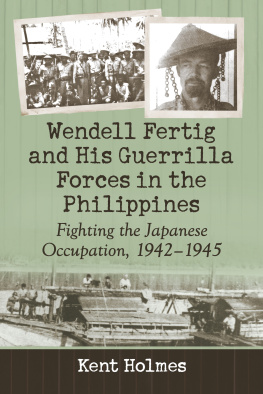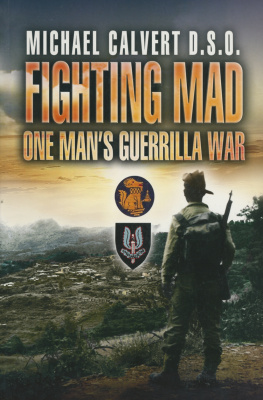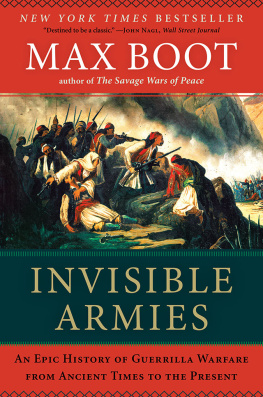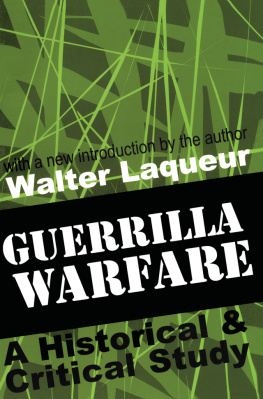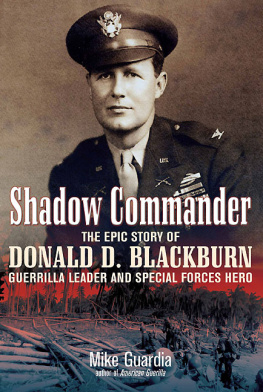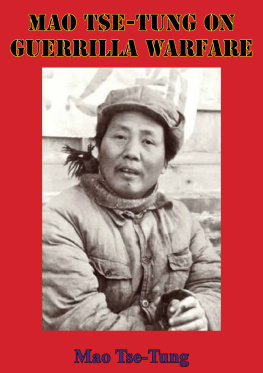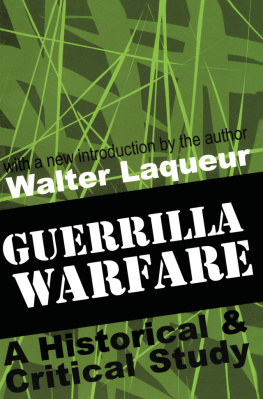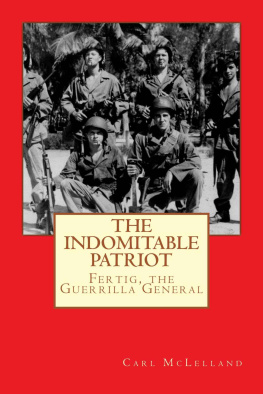This edition is published by Arcole Publishing www.pp-publishing.com
To join our mailing list for new titles or for issues with our books arcolepublishing@gmail.com
Or on Facebook
Text originally published in 1961 under the same title.
Arcole Publishing 2017, all rights reserved. No part of this publication may be reproduced, stored in a retrieval system or transmitted by any means, electrical, mechanical or otherwise without the written permission of the copyright holder.
Publishers Note
Although in most cases we have retained the Authors original spelling and grammar to authentically reproduce the work of the Author and the original intent of such material, some additional notes and clarifications have been added for the modern readers benefit.
We have also made every effort to include all maps and illustrations of the original edition the limitations of formatting do not allow of including larger maps, we will upload as many of these maps as possible.
NOTES ON GUERILLA WAR
PRINCIPLES AND PRACTICES
BY
COLONEL VIRGIL NEY
PREFACE
IN THEORY and practice, civilian resistance of military forces takes many forms. The principal methods of resistance are: sabotage; espionage; assassination; terror ; kidnapping ; subversion; propaganda; guerrilla war . The latter operational format may be considered the spearhead or the militant phase of resistance. These patterns are dictated, to a great extent, by the modus operandi of the attacking or occupying hostile force. The status quo of the moment will indicate the overall situation relative to the presence or absence of a favorable or unfavorable climate for the initiation of resistance warfare of any or all of the patterns previously mentioned. How this is to be determined, who makes the decision as to the resistance method to be employed and who directs the effortis not often established before the hostile invasion is well-organized and committed within the nation concerned. Historically, it can be shown that the making of pre-invasion resistance plans is feasible but that they are not made generally . Such plans are made on the spur of the moment, this is at the same time, a strength and a weakness.
Unconventional warfare has of recent years come into its own as a force to be reckoned with by the military as well as the political branches of modern governments. That certain governments have recognized the great potential in this form of warfare is demonstrated by their operations within this area of conflict. Reference, in this connection, is made specifically to the Soviet Union and its satellites. The Communist camp has long been a true believer in the efficacy of unconventional war as an instrument of national policy. {1}
With the general, but somewhat reluctant acceptance by the military, that civilian resistance has a place as a weapon in the arsenal of war, planning for this important activity of national survival must be included in every conventional war plan extantwithin the Free Nations of the world. That the Communist Nations have such plans has been demonstrated. World War II proved beyond a doubt that the Soviet Union had prepared plans for the conduct of civilian resistance years before the Nazi attack. In this respect, the Satellites of the Soviet Union have conformed to the patterns set by Moscow.
When the Germans occupied a town, the head men among the inhabitants dug up buried rifles and machineguns, got away to some rendezvous in a forest or gorge, joined or organized a guerrilla band, and made sudden forays on oil tanks, railroads and supply dumps. The other inhabitants, living in squalor and misery and on the verge of starvation, were their accomplices and turned many a trick on their own account. {2}
In a comparative sense, guerrilla war bears the same relationship to civilian resistance that formal battle bears to conventional warfare. From the practical point of view, guerrilla war is the most ambitious and complex form of civilian resistance. This is so because of its almost military requirements of planning, recruiting, propaganda, supply, leadership, training and organization.
It is the concept of the author that resistance war is governed by specific principlesas is conventional warfare. The principles which are deduced in this work, in accordance with this concept, apply equally to all the facets of civilian resistance previously indicated herein. The relative importance of each in the prosecution of resistance warfare is great. However, it must be noted carefullythat there is considerable overlap and much interdependence within the framework of these activities. Throughout this work, the author emphasizes the fact that the principles essential to the conduct of Guerrilla War are equally applicable and necessary to Resistance Warfare of which Guerrilla War is the spearhead. The paramilitary aspects of the Cold War are almost exclusively carried out by guerrilla actions. In view of this fact, the military policy of the United States has been modernized to include Guerrilla War as an important tactic. Conversely, Counter-guerrilla action is receiving a considerable amount of attention on the part of the military professional. {3}
Within the context of the cold war being waged, in many instances by Guerrilla means, between the forces of communism and the Democratic Nations, counter-Guerrilla tactics and techniques have assumed a position of primary importance to the military professional. How to defeat the guerrilla in the pressing question not only to the soldier, but to the planners of both political and military policy.
... IN MOST AREAS of the world, the main burden of local defense against overt attack, subversion, and guerrilla warfare must rest on local populations and forces. But given the great likelihood and seriousness of this threat, we must be prepared to make a substantial contribution in the form of strong, highly mobile forces trained in this type of warfare, some of which must be deployed in forward areas, with a substantial airlift and sealift capacity and pre-stocked overseas bases...
PRESIDENT JOHN F. KENNEDY
in Budget Message to the
Eighty-Seventh Congress,
28 March 1961
One of the most successful modern counter-guerrilla campaigns was achieved in the Philippines after World War II and its attendant Hukbalahap Communist Guerrilla Movement. The methods utilized by Ramon Magsaysay, at that time the Philippine Secretary of Defense, and later President, were marked by combination of the Direct and Indirect approach to the guerrilla problem. By skilful and courageous leadership, beginning at the top, the Filipinos were able to destroy eventually the power of the Communist Huk Guerrilla movement. How this was done is told in a most succinct manner by the following extract:
In 1949 the movement changed its name to Hukbong Mapagpalaya Ng Bayan, or the Peoples Liberation Army. Its leaders stated that their objective was the overthrow of the Government and the establishment of a Communist regime. The Huks then undertook large-scale raids in the vicinity of Manila and captured several important provincial towns. The movement spread rapidly, and by 1950 the Huks boasted a force of 10,000 armed men under disciplined Communist leadership.


